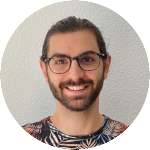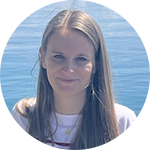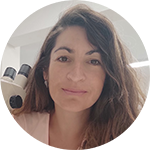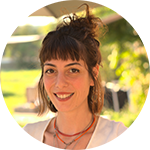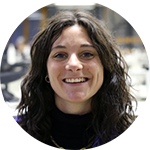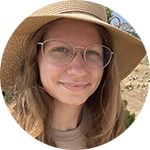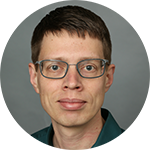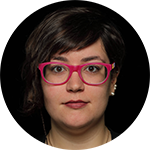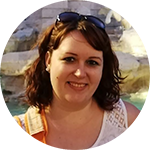Meet the team
Andrea Mészáros
Andrea (Eötvös Loránd University) is a doctoral student in the Department of Archaeology at the ELTE Faculty of Humanities, Doctoral School of History. She completed her bachelor and master studies at the Department of Migration Periods. Her doctoral thesis is on the bead material of the Avar cemeteries around Tiszafüred, their composition, and their distribution and trade situation in the Carpathian Basin in the Early Middle Ages.
Anna Karligkioti 
Anna (Cyprus Institute) is a PhD candidate in Bioarchaeology, funded by the A.G. Leventis Chair for Archaeological Sciences. In her Ph.D titled Biocultural transformations in central mainland Greece from the Classical to the Roman era, under the supervision of Associate Professor E. Nikita, Anna is combining osteoarchaeological evidence, mortuary data and historical information, aiming to examine biocultural determinants of identity and social differentiation, expressed through health inequalities, differential access to dietary resources, genetic affiliation and activity patterns in the Greco-Roman world. Anna joined the Cyprus Institute in July 2018 after studying Prehistoric Archaeology at Aristotle University of Thessaloniki, Greece (2018), Human Osteology and Funerary Archaeology at the University of Sheffield, UK (2014) and History and Archaeology at the University of Ioannina, Greece (2010). Since then, she got engaged with projects examining population dynamics and mobility of past populations, spanning classical and late antiquity until post-medieval/Ottoman era Cyprus. In addition, she is currently a research associate at the Phaleron Bioarchaeology project of the American School of Classical Studies at Athens in Greece.
Baptiste Solard 
Baptiste (Universität Tübingen) completed his Diplôme d’ingénieur chimiste (BSc and MSc equivalent) in Material Sciences at the National Graduate School of Chemistry of Montpellier, France (ENSCM) in November 2019. In October 2021, he successfully finished his master of Archaeological Sciences with specialisation in archaeometry (MSc) at the University of Tübingen (Germany), Department of Geoscience, Institute for Archeological Sciences with a thesis on Atticising Black Gloss ceramics from the 4th century BCE. Since December 2019, he is a research assistant at the Competence Center Archaeometry - Baden-Württemberg (CCA-BW), working in various projects on ancient ceramic technology. In April 2023, he started his PhD at the University of Tübingen on Merovingian opaque coloured glass production in Zürich, Switzerland.
Chase Minos 
Chase (Cyprus Institute) is a PhD candidate in the Science and Technology in Archaeology and Culture Research Centre. He completed his undergraduate degree at the University of St Andrews, and has an MPhil from the University of Cambridge as well as an MSc in experimental archaeology from University College Dublin. Chase is currently a Marie Skłodowska-Curie doctoral fellow part of the premodern plasters and ceramics international training network (PlaCe-ITN). In his PhD, he investigates how raw materials and clay recipes were affected by the use of a new technology, the potter’s wheel, during the Late Bronze Age on Cyprus, and uses an integrated approach involving thin-section petrography, chemical analyses and experimental archaeology.
Enikő Somogyvári-Lajtár
nikő (Eötvös Loránd University, Hungary) is a PhD candidate in bioarchaeology at the Institute of Archaeological Sciences, Eötvös Loránd University, Hungary. In her PhD titled Diet and lifestyle in the Neolithic — According to the stable isotope geochemical research of Polgár-Ferenci-hát and Polgár-Csőszhalom sites under the supervision of Senior Research Fellow, Dr. A. Anders. Enikő combines stable isotope geochemical results on human remains with the previous archaeological and physical anthropological information to examine dietary habits and lifestyles at individual and population levels. She also wrote her Bachelor’s and Master’s thesis on archaeological dietary reconstruction using stable isotope geochemical methods. She is currently a junior research fellow in the Archaeometry and Bioarchaeology Research Group at the Institute for Geological and Geochemical Research, HUN-REN RCAES, Budapest, Hungary.
Eszter Solnay 
Eszter (Eötvös Loránd University, Paris 1 Panthéon-Sorbonne University) is a PhD candidate in archaeology at Eötvös Loránd University (ELTE), Budapest, Hungary and at Paris 1 Panthéon-Sorbonne University, Paris, France. She is a member of the UMR 8215 Trajectoires Laboratory in Paris and part of the MTA-ELTE Lendület “Momentum” Innovation Research Group at Eötvös Loránd University, Institute of Archaeological Sciences in Budapest. Her studies focus on analysing prehistoric pottery vessel making, especially the forming and surface treatment techniques on Early and Middle Copper Age vessels from the Carpathian Basin (Hungary).
Kyriaki Tsirtsi 
Kyriaki (Cyprus Institute) has extensive experience in archaeobotanical research, both in the field and in the laboratory. For her PhD research, defended in November 2022, Kyriaki combined different archaeobotanical and scientific techniques in understanding the agricultural and domestic economies of Classical Sikyon (Greece). During her PhD studies, she was fully embedded in the field team, designing recovery protocols, supervising recovery in the field, and analysing resulting material, thereby becoming an expert in the flora of the Aegean and the current models of the economy and social organization of the first millennium BCE.
Throughout her PhD studies she was also awarded two Erasmus+ Programs; one took place in 2018, in the School of Archaeology of the University of Oxford and the second in 2021 in the Humana, IMF-SCIC Institute, in Barcelona. Both Erasmus programs focused on microbotanical studies and specifically the analysis of starch granules retrieved from the interior of ceramic pots, in order to reconstruct cooking and consumption patterns in the 1st millennium BCE in Greece. She has also held the British School of Athens Centenary Bursary in order to conduct similar research in Oxford related to the Keros research and excavation project of the University of Cambridge (2019).
In MedisFood, Kyriaki holds a Post-Doctorate position where she explores the long durée of plant choices of the 3rd/2nd millennium BCE, the varieties of grapes and olives exploited in the biggest islands of the Eastern Mediterranean, Crete and Cyprus, and addresses key questions related to the rise of complex societies in both islands. The simultaneous analysis of both islands allows not only the understanding of the unique social and agricultural structures of each island, but also the definition of patterns and tendencies that may have appeared at the same time on both regions and which may reflect adaptations, influences and ultimately connections with other areas, or even directly between Crete and Cyprus.
Sinem Hacıosmanoğlu 
Sinem (Universität Tübingen) is a PhD candidate at the University of Tübingen, Germany, Department of Geoscience, Institute for Archeological Sciences. She completed her bachelor (BSc) and master (MSc) at Istanbul Technical University (Turkey) in the Department of Geological Engineering. In her PhD project, she investigates clay resources and ancient ceramics from the Late Bronze Age and the Iron Age in Cilicia, Southeast Anatolia, Eastern Mediterranean by using several disciplines, such as mineralogy, petrography, geochemistry and field geology. In addition, she is working as a research assistant on several projects funded by the German Research Foundation (DFG) and hosted at the Competence Center Archaeometry - Baden-Württemberg (CCA-BW). Since 2023, she has been contributing as a scientific researcher at the Leibniz-Zentrum für Archäologie (LEIZA) focusing on Roman Pottery from Speicher.
Prudence Robert 
Prudence (Ghent University) is a PhD candidate in bioarchaeology at Archeos, the Research Laboratory for Biological Anthropology. She earned her bachelor’s degree in archaeological science from the University of Bordeaux, including an Erasmus year at Durham University. There, she later completed her master’s degree focusing on ancient DNA and isotope analysis on human remains. Since 2022, Prudence has been part of the ROAM project (Regional Outlook in Ancient Migration) for her PhD, studying human and faunal remains from the Late Prehistory (Late Palaeolithic and early Holocene) in modern-day Belgium. Her research aims to reconstruct past life-ways using multi-isotope analysis and to improve the related methodologies.
Rebeka Gergácz
Rebeka (Eötvös Loránd University; Hungarian National Museum) is a PhD candidate at Eötvös Loránd University, Doctoral School of History (Budapest, Hungary) and an archaeologist at the Hungarian National Museum, National Institute of Archaeology (Budapest, Hungary). She completed her bachelor’s (BA) and master’s (MA) at Eötvös Loránd University (Hungary) in the Department of Archaeometry and Archaeological Methodology with a focus on the non-destructive surveying of multi-period site complexes and GIS. She started her PhD in 2023, investigating Late Iron Age settlements and their patterns in the Váli Valley (Hungary) using non- and semi-destructive research methods such as fieldwalking, aerial reconnaissance, geophysical prospection and metal detector surveying. She also plans to analyse the gained data in GIS to better understand the Late Iron Age settlement patterns and landscape in the area.
Tamanna Jahan Keya
Tamanna (Jahangirnagar University) is a post-graduate student in the Department of Archaeology at Jahangirnagar University, a well-known public university in Bangladesh. She completed her Bachelor of Social Science at Jahangirnagar University in the Department of Archaeology. In her master’s thesis, she investigates the chemical composition of uninscribed cast copper coins, their minting process and the nature of the copper coins’ corrosion. Currently, she is working as a graduate researcher in the Department of Archaeology, Jahangirnagar University. Moreover, she worked as an assistant researcher in several archaeometry research projects funded by the Faculty of Arts and Humanities, Jahangirnagar University. Since her 2nd year of undergraduate education, she participated in several archaeological excavations across various regions of Bangladesh. Her research focusing area is archaeometallurgy, more specifically ancient copper metallurgy. Her research works attempt to fill the scientific gap existing in the analysis of ancient metal artifacts in the Bangladesh context.
Thomas Rose 
Thomas (Deutsches Bergbau-Museum Bochum) is researcher at the research area Archaeometallurgy of the Deutsches Bergbau-Museum Bochum in the DFG-funded project “GlobaLID – Building an interface between geochemistry and archaeometry to create a new research infrastructure with a global perspective”. He gained expertise in ancient copper metallurgy with focus on the Chalcolithic Southern Levant and stable metal isotope systems and is maintainer of the R package ChronochRt. He is executive board member of the Gesellschaft für Naturwissenschaftliche Archäologie ARCHAEOMETRIE e.V and council member of the Historical Metallurgy Society. More info at copper-smelting.com.
Vasiliki Anevlavi 
Vasiliki (Austrian Archaeological Institute) studied the Master of Science in Cultural Heritage, Materials and Technologies and completed her Bachelor’s degree at the School of Humanities, Department: History, Archaeology and Cultural Resources Management (Archaeology Department), University of the Peloponnese, Kalamata, Greece. Since 2010, she has been working on various projects in Greece, Turkey and Malta. Since November 2020, she has been studying for a PhD (dissertation: “Production and use of white marble in Roman Thrace”). Currently, she is a freelance researcher in projects related to white marble provenance studies.
Viktória Mozgai 
Viktória is a researcher of the Archaeometry and Bioarchaeology Research Group at the Institute for Geological and Geochemical Research, HUN-REN Research Centre for Astronomy and Earth Sciences, Budapest. She defended her PhD titled Detailed examination of late Roman silver finds (including the Seuso Treasure) from Pannonia –The use of the results in the archeometric research of objects in 2023 at the Doctoral School of Earth Sciences, Faculty of Science, Eötvös Loránd University, Budapest. Her main research field is the detailed archaeometric study of archaeological and historical gold-, silver- and copper-based alloy objects and their decoration techniques (gilding, niello- and garnet inlays). She is involved in several research projects on artefacts from prehistoric to early medieval times.


